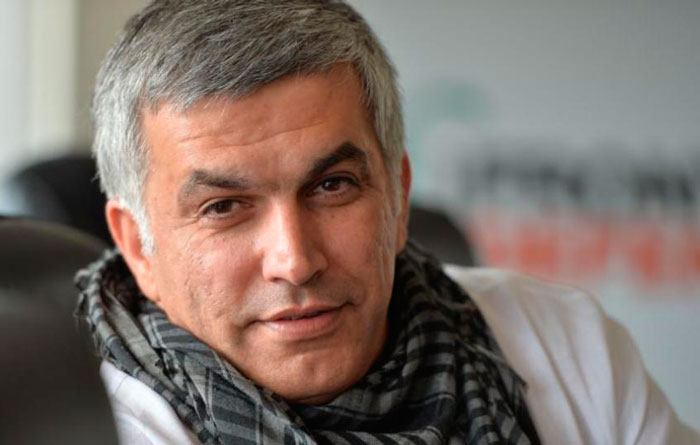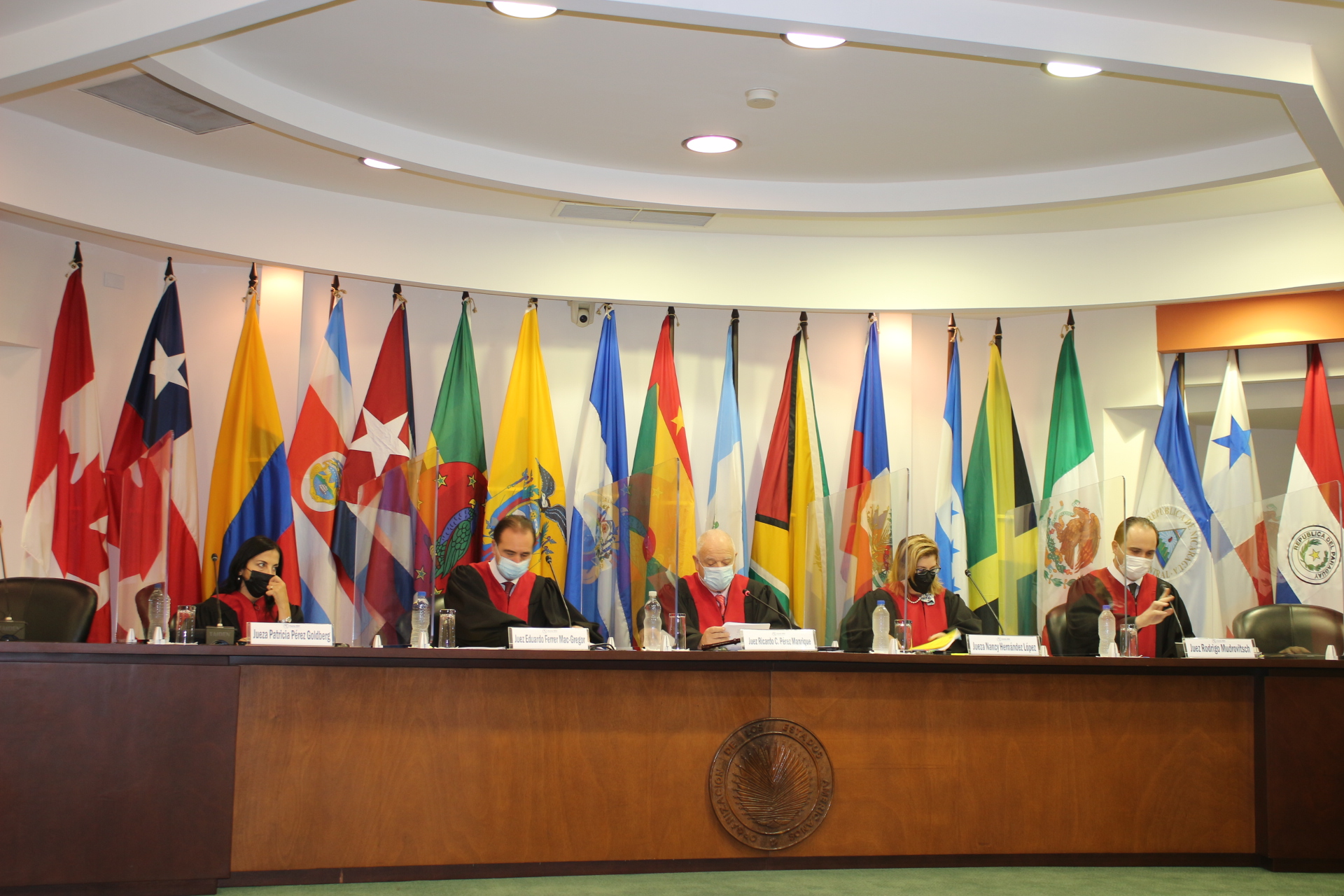(Geneva) – As the 32nd session of the United Nations Human Rights Council opened in Geneva on 13 June, Nabeel Rajab, Bahrain’s most high profile human rights defender, was arrested after dozens of police officers raided his home at around 5am and confiscated his electronic devices. The day before, Bahraini human rights defenders and victims of violations were prevented from flying to Geneva.
Release arbitrarily detained human rights defenders
Rajab, President of the Bahrain Center for Human Rights (BCHR), founding Director of the Gulf Centre for Human Rights (GCHR) and Deputy Secretary General of FIDH, was reportedly arrested under order from the Ministry of Interior’s Cybercrimes Unit. Bahraini officials had imposed a travel ban on Rajab a year ago, and since April 2015 have maintained charges against him for crimes related to freedom of expression online. Despite the submission of several appeals against the ban, authorities remained unresponsive. On 14 June 2016, Rajab was transferred to the public prosecution; and new charges were brought against him of allegedly ‘publishing and broadcasting false news that undermines the prestige of the state’. The public prosecution remanded him to seven days in detention pending investigation.
Lift travel bans preventing access to the UN in Geneva
In a new and concerning escalation of its crackdown against civil society, Bahraini authorities have also banned human rights defenders from leaving the country. The bans were imposed as the activists were attempting to travel from the Bahrain International Airport to Geneva to participate in the 32nd session of the Human Rights Council. The undersigned organisations are seriously alarmed by Bahrain’s restrictions civil society especially the restrictions preventing them from engaging with the UN.
On 12 June 2016, the Nationality, Passport, and Residence Department officials at Bahrain International Airport prevented at least six individuals from boarding their planes to Geneva. Bahraini authorities imposed a travel ban on Hussain Radhi of BCHR, Ebtisam Al-Saegh, Ebrahim Al-Demistani, someone who does not wish to be named, and the parents of Ali Mushaima, a victim of extrajudicial killing in 2011. The father of another victim of extrajudicial killing, Sayed Hashim, was stopped at King Fahd Causeway and told of the ban.
On 12 June, the authorities at the airport held the passports of Radhi and Al-Saegh for 45 minutes before informing them they were banned from traveling. They were referred to the Ministry of the Interior’s Nationality, Passport, and Residence Department to inquire about the reason for the ban. However, after inquiring at the Department, they were told that there are no travel bans imposed on them. Radhi and Al-Saegh then tried to travel through King Fahd Causeway but were again stopped for up to an hour and told that they cannot travel because of the travel ban.
Al-Demistani was also told that a travel ban – of which he had no prior knowledge – was imposed on him. An official at the Nationality, Passport, and Residence Department confirmed to him that there had been a notice on his name imposed by the public prosecution since 9 June 2016.
On 10 June 2016, authorities banned Dr Taha Al-Derazi, a former political prisoner and activist, from traveling to the United Kingdom with his wife. He too was told to inquire at the Immigration, Passport, and Residency Department for more information but was also given no reason for the ban. Dr Al-Derazi participated in the previous HRC session and it is believed that the ban is to prevent him from participating in the current session.
On 13 June 2016, Jalila Al-Salman, vice president of the dissolved Bahrain Teachers Society, was not allowed to leave Bahrain when she attempted to travel to Oslo. A travel ban has also been in place against human rights activist Maytham Al-Salman following his participation in various international human rights related conferences.
Preventing civil society from engaging with the UN is a relatively new tool being used in Bahrain to intimidate and silence freedom of expression. A pattern of reprisals against human rights defenders has emerged to prevent reporting on severe ongoing rights abuses in the country. As a signatory to the International Convention on Civil and Political Rights (ICCPR), Bahrain has committed to uphold international standards of freedom of movement and freedom of expression. Article 12 of the ICCPR states that, ‘everyone shall be free to leave any country, including his own’. Article 19 states that ‘everyone shall have the right to freedom of expression’. Both rights can only be restricted in limited circumstances.
On 6 June 2016, human rights defender Zainab Al-Khawaja and her two children, Jude and Abdulhadi, arrived in Denmark, where she is a dual citizen, after she was forced to leave the country. Al-Khawaja reported that after she was released from prison on 31 May 2016, she was threatened that if she did not leave Bahrain immediately, she would face new cases with lengthy sentences that would result in her being separated from both her children.
UN Human Rights Council and Special Procedures should act on Bahrain
In light of this escalated attack on civil society in Bahrain, we call for the immediate release of all human rights defenders in Bahrain, including Nabeel Rajab, and for the removal of the imposed travel bans which unfairly restrict activists’ freedom of movement. We also request that the President of the HRC, the UN High Commissioner for Human Rights, the Special Rapporteur on the Situation of Human Rights Defenders, the Special Rapporteur on Freedom of Opinion and Expression and the Special Rapporteur on the Rights to Freedom of Peaceful Assembly and Association call on the Bahraini authorities to immediately and unconditionally lift the travel ban imposed on Bahrain’s civil society activists and guarantee Bahraini human rights defenders are free from intimidation and restrictions on their work, including at the UN. We also call on the international community to hold the government of Bahrain to its commitments and obligations to foster a safe environment for the peaceful enjoyment of universal human rights.
The government of Bahrain must immediately stop the ongoing reprisals against human rights defenders who are engaging with international mechanisms including the UN system.
Signed:
- Americans for Democracy & Human Rights in Bahrain (ADHRB)
- Arabic Network for Human Rights Information (ANHRI)
- Bahrain Center for Human Rights (BCHR)
- Bahrain Institute for Rights & Democracy (BIRD)
- Cairo Institute for Human Rights Studies
- CIVICUS: World Alliance for Citizen Participation
- English PEN
- European Centre for Democracy & Human Rights (ECDHR)
- FIDH, within the framework of the Observatory for the Protection of Human Rights Defenders
- Front Line Defenders
- Gulf Centre for Human Rights (GCHR)
- IFEX
- Index on Censorship
- International Service for Human Rights (ISHR)
- Justice Human Rights Organization (JHRO)
- Lawyer’s Rights Watch Canada (LWRC)
- PEN International
- Rafto Foundation for Human Rights
- Reporters Without Borders (RSF)
- Vivarta
- World Organisation Against Torture (OMCT), within the framework of the Observatory for the Protection of Human Rights Defenders




